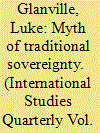| Srl | Item |
| 1 |
ID:
115039


|
|
|
|
|
| Publication |
2012.
|
| Summary/Abstract |
In recent years several important books have argued that the United States of America, China, Russia and even the European Union "look, talk and walk" like empires. However, these books have failed to impress those working in the field of international relations. For some, the Westphalian state is still the major unit of analysis. Others prefer to use the terms "great powers" or "hegemony." This research note will, first, try to assess the added value that the concept of empire brings to the study of international relations. The second aim is to establish how best to study contemporary empires. Which actors can be classified as empires? Should one focus on imperial structure, mission or behaviour? The third objective is to seek ways of identifying patterns of cooperation and competition among empires. Can the contemporary manifestations of empire co-exist without major conflict?
|
|
|
|
|
|
|
|
|
|
|
|
|
|
|
|
| 2 |
ID:
119642


|
|
|
|
|
| Publication |
2013.
|
| Summary/Abstract |
The conventional story of sovereignty told in the discipline of International Relations (IR) tells us that there is a "traditional" or "Westphalian" meaning of sovereignty that has prevailed since the seventeenth century and that accords states the right to govern themselves free from outside interference. In recent years, the tale goes, this meaning has been challenged for the first time by notions of conditional and responsible sovereignty. This article argues that the supposed "traditional" meaning of sovereignty is not as foundational and timeless as is often assumed. Rather than a right of non-intervention, it was the right to wage (just) war that was first conceived by political theorists to be the external corollary of the internal supremacy of the sovereign. This included the right of war to punish tyranny and rescue the oppressed. This article examines the initial absence and then the gradual emergence of the "traditional" meaning of sovereignty, arguing that it was only firmly established by international society for the first time in the twentieth century. It concludes by considering some of the implications of this revised story of sovereignty for the study of IR.
|
|
|
|
|
|
|
|
|
|
|
|
|
|
|
|
| 3 |
ID:
096569


|
|
|
|
|
| Publication |
2010.
|
| Summary/Abstract |
In the past 10-15 years, an increasing number of revisionist scholars have rejected the most significant elements of the argument about the centrality of the Peace of Westphalia (1648) to the evolution and structure of international society. At the same time, the prominence of this argument has grown in the English School and constructivist international relations scholarship. I deconstruct the function of the Westphalian narrative to explain its pervasiveness and persistence. I argue that it was first developed by nineteenth century imperial international jurists and that the Westphalian narrative perpetuates a Eurocentric bias in international relations theory. This bias maintains that Westphalia created an international society, consolidating a normative divergence between European international relations and the rest of the international system. This dualism is predicated on the assumption that with Westphalia European states had solved the anarchy problem either through cultural or contractual evolution. Non-European states, lacking this European culture and social contract, remained in anarchy until the European states allowed them to join the international society-upon their achievement of the "standards of civilization." This Westphalian narrative distorts the emergence of the modern international system and leads to misdiagnoses of major problems of contemporary international relations. Furthermore, their commitment to the Westphalian narrative prevents international relations scholars from adequately theorizing about international interdependencies and accommodating global pluralism.
|
|
|
|
|
|
|
|
|
|
|
|
|
|
|
|